-
RAISE HELL: THE LIFE AND TIMES OF MOLLY IVINS (Janice Engel 2018)
JANICE ENGEL: RAISE HELL: THE LIFE AND TIMES OF MOLLY IVINS (2018)
[SUMMARY ONLY]

RAISE HELL: The Life & Times of Molly Ivins tells the story of media firebrand Molly Ivins, six feet of Texas trouble who took on the Good Old Boy corruption wherever she found it. Her razor sharp wit left both sides of the aisle laughing, and craving ink in her columns. She knew the Bill of Rights was in peril, and said "Polarizing people is a good way to win an election and a good way to wreck a country." Molly's words have proved prescient. Now it's up to us to raise hell!
-IMDB
Last edited by Chris Knipp; 04-20-2019 at 05:17 PM.
-
SUBURBAN BIRDS 郊区 的 鸟 (Qiu Sheng 2018)
QIU SHENG: SUBURBAN BIRDS/郊区的鸟/JIAO QU DE NIAO (2018)
(Originally published for New Directors/New Films)
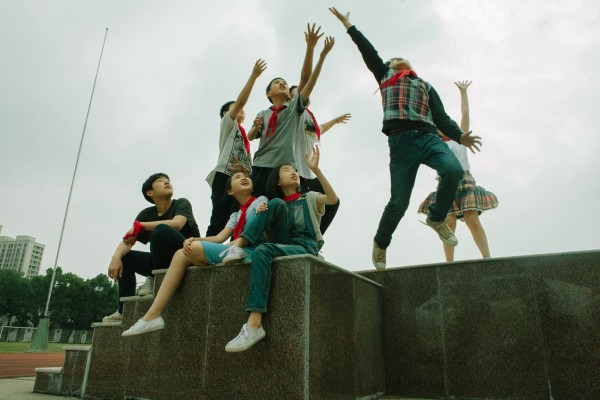
STILL FROM SUBURBAN BIRDS; THEY WEAR RED COMMUNIST CHILDREN'S LEAGUE BANDANAS AT ALL TIMES
Strange Chinese debut lodged in the suburbs mixes the dry and arty with the charming and nostalgic
The frame tale of this directorial debut from China, if it can be seen as that, focuses on a group of young surveyors recording or investigating tall buildings that are sinking in a suburban area. They need information on the subsidence of the land in preparation for a subway construction project that is being held up till their report's completion. There are ample references to the waste and destruction and mass dislocation of modern China. Meanwhile, the larger, more rambling center section follows half a dozen school children, great pals, who wear red Communist Children's League of China bandanas (at all times!). They are cute and charming and play at various games, including a full-scale battle with toy automatic weapons. Some of them have nicknames like Foxy (Qian Xuanyi), Fatty (Chen Yihao), Old Timer (Xu Chenghui), Coal (Chen Zhihao) or Radish. There is an idyllic, nostalgic quality about these summertime pre-teen scenes.
One character, Xiahao, seems to occur both as an adult surveyor (played by Mason Lee, son of Ang Lee) and one of the kids (played by Gong Zihan), though it's not a sure thing these aren't just two different Xihaos. Guy Lodge of Variety points out the two worlds are distinguished by two visual styles: "The adult story is heavy on choppy, discomfiting zooms, the children’s tale all serene, sun-slowed tracking and panning." Both make use of occasional fast zooms, somewhat in the manner of Hong Sang-soo.
Among the surveyors, who are all staying in a soulless hotel, there is disagreement over the cause of the subsiding land, while Officer Jiang (Wang Xinyu) just represent's the party's interest in rushing through the survey so as to get the subway project under way fast no matter what. At the hotel Xiahao meets a loose young woman, Swallow (Huang Lu) and they have sex, introducing a messier, more sensual note into the otherwise cool, tidy story whose tone is set by the neat appearance of the young men and the orderliness of their activity involving leisurely calculations and measurements.
In her review for Hollywood Reporter, Leslie Felperin points out the two sets of characters are unrelated, but are related. There are inexplicable rhymes, and the kids are playing in the same neighborhood where the surveying is going on. The narrative link and signal for the childhood recollections to begin is the finding of a student's diary by the adult Xiahao.
Director Qiu has coaxed wonderfully natural and relaxed performances out of the child actors. To underline the kids' friendship, when they come home to relax, they lie all over each other in a friendly clump. Something like that is echoed between two of the adult guys in the final shot, when the children, who otherwise may have seemed to be many years earlier in time, are also present singing the Communist Youth song in the same woods.
At the end among the kids, Fatty disappears, and the rest of the half dozen go looking for him, then one by one they each themselves disappear. The literal "suburban bird", which interests both Xiahaos, is the rare Sialia Suburbium, which Swallow tells the adult Xiahao does not exist. Then the focus returns to the surveyors, finally ending with another flashback, but to a more recent time.
There is a review on EasternKicks.com where the writer, Andrew Heskins, points out the film is half "non-linear and experimental" and half a "heart-warming coming-of-age drama." A review by the knowledgeable but hard to please former Variety critic Derek Elley for Sino-Cinema disparagingly calls this film a "vague elegy for simpler times" (referring to the idyllic life of the young kids, no doubt) that's "an empty can, and too film schooly for its own good." Guy Lodge calls it "a seductively inscrutable puzzler," and that puts it well: it's both off-putting and fun to watch.
Suburban Birds/郊区的鸟/Jiao qu de niao, 118 mins., debuted 24 Jul. 2018 at Xining First Film Festival, and in Europe at Locarno, showing also at three other festivals. It was screened for this review as part of The MoMA-Film Society of Lincoln Center series New Directors/New Films, Mar. 2019.
Also showing at the San Francisco Film Festival. (There, it received Special Jury Mention, New Directors.)
SFFILM showtime:s
Thu, Apr 11 at 6:00 pm - Roxie Theater (EVENT HAS PASSED)
Fri, Apr 19 at 9:00 pm - Roxie Theater
It will also be showing at Roxie Theater starting May 10.
TRAILER
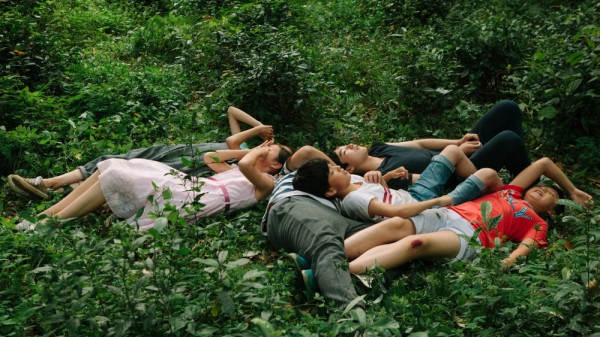
THEY LIE ALL OVER EACH OTHER IN A FRIENDLY CLUMP
Last edited by Chris Knipp; 04-22-2019 at 01:32 PM.
-
TEHRAN: CITY OF LOVE (Ali Jaberansari 2018)
ALI JABERANSARI: TEHRAN: CITY OF LOVE (2018)
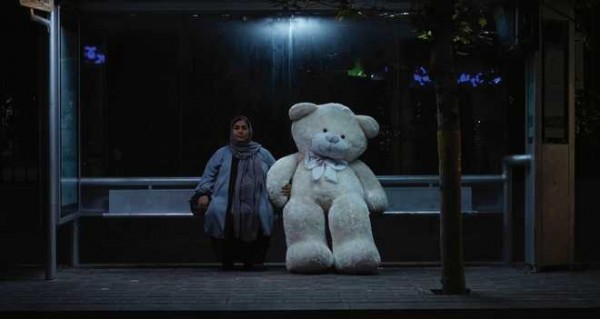
FOROUGH GHAJABAGLI IN TEHRAN: CITY OF LOVE
All the lonely people
The three characters who wend their slow way through Ali Jaberansari's Tehran: City of Love are disenchanted and gloomy and glum, and their sad-sack aspirations are low. They interconnect with each other minimally. Hessam Fezli (Amir Hessam Bakhtiari) is a lonely champion body builder of a certain age. He won three championships. A giant tattooed man with a top knot, he works in a gym, physical trainer for ordinary guys and old men. He gets hired for a film which, teasingly, has something to do with Louis Garrel, but not really. The actual shoot is some time in the future.
Then a handsome young bodybuilder, disenchanted with his previous trainer, takes on Hessam tentatively to train him for a competition. It is obvious this is a dream for the perhaps repressed Hessam, who isn't interested in women. We know that because he gives the brush off to Mina Shams (Forough Ghajabagli), the overweight receptionist at a beauty studio where he goes to get botoxed. When the body builder seems contented with Hessam, Hessam goes and resigns from the film, breaking his contract, to devote himself wholeheartedly to the young man.
Mina has a second cell phone she uses to make suggestive calls to men, and she sets up dates using fake pictures of young babes, but it's just a silly, unhealthy game, born of hopelessness. Then she goes to a life class proposed to her by Niloufar (Behnaz Jafari). There Reza, already a student in the class, takes an interest in Mina, inviting her out, not caring that she's overweight and sharing her taste for ice cream. (She doesn't quite give up her unhealthy phone games, though.)
Through Niloufar, Vahid (Mehdi Saki), attached to a mosque, working as a singer at funerals, gets to try a gig at a wedding, which is where she works. He gives it a try, but then through a keyboard player (if I understood this development) he gets in trouble for performing at an "unapproved activity," a joyous event that is not permitted by Iran's strict religious government. The mosque official takes him back, disapprovingly. He admits that loss of the wedding gig doesn't really matter, though he did seem to like being a happy instead of a sad performer for a while. All he really wanted, though, he tells Niloufar, was the opportunity to see her. Unfortunately, as Niloufar has already told Mina (they're chums), her lawyer has finally gotten her a visa, and she is soon going to be leaving for Australia.
As for Mina, on one of their dates, Reza reveals that he is married with a young kid. He's getting divorced, but it "is taking such a long time." So he's not really as available as he had let her assume for a while. She orders a double deluxe ice cream; this time he abstains. Later, Reza sends Mina a giant teddy bear at work as a consolation prize.
Poor, glum Hessam Fezli. Even when he's standing behind his handsome young body builder, guiding his arms in a hard workout, he never cracks a smile. Mina does smile and looks pretty when she's with Reza, and Vahid gets lively when he's performing at the parties. Maybe the young aspiring champion body builder feels uneasy with Hessam's attentions, especially after he's invited to Hessam's father's house. (Both Hessam and Vahid seem to live with their fathers.) The young body builder tells Hessam a lie to get out of their relationship, claiming that his travel schedule for work just doesn't allow him time to train and he must give up the idea of the competition (which isn't true).
So Hessam, Mina, and Vahid wind up more or less back where they started. Director Jaberansari finds his perfect final image in Mina with the giant teddy bear, Vahid, and Hessam, all sitting far apart, alone together, on an empty bus riding home.
This does seem a far cry from most other Iranian directors. Jaberansari, whose second feature this is, comes across here as an urban miniaturist, signaled by his ironic reference to Tehran in the title, by the tripartite structure, and by the reduced expectations. One might think of Aki Kaurismäki, or of Roy Anderssen, but with most of the whimsy and surrealism edited out. There is control here, and the film held my attention tight all the way through, while keeping my expectations to a minimum. The hopelessness and loneliness of some urban lives is painted here with painful precision. It seems to fit modern Iranian urban culture, with its intense restrictions on fun. Glum is in. How do you find your way around it? How do you find love in Tehran?
Tehran: City of Love, 102 mins. debuted at London Oct. 2018, and played in at least ten other international festivals since, including the San Francisco Film Festival, where it was screened for this review.
SFFILM showtimes:
Tue, Apr 16 at 6:00 pm - Roxie Theater
Wed, Apr 17 at 9:15 pm - SFMOMA Phyllis Wattis Theater
Thu, Apr 18 at 6:00 pm - Berkeley Art Museum/Pacific Film Archive
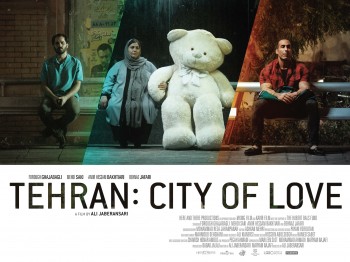
Last edited by Chris Knipp; 04-19-2019 at 01:43 AM.
-
TONI MORRISON: THE PIECES I AM (Timothy Greenfield-Sanders 2019)
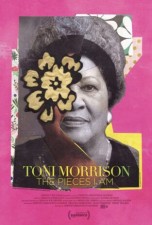
TIMOTHY GREENFIELD-SANDERS: TONI MORRISON: THE PIECES I AM (2019)
An "American Masters" film about her life and work mainly narrated directly into the camera by Morrison herself with lots of amazing photographs and film clips to illustrate and with talking heads including Hilton Als, Oprah Winfrey, Fran Lebowitz and various others. She is a formidable and engaging person, an insinuating, gentle, but utterly confident speaker. Amazingly, she is 88. Why does she laugh so much in recounting her life? A sense of fun perhaps. I can't really comment or evaluate because I have not read any of her work. I've always feared it would be too melodramatic, or just not for me. For somebody who has won so many awards, including the Nobel Prize for Literature in 1993, this is probably blind of me. But this film didn't really change my opinion. Magnolia theatrical release coming Jun. 21. It debuted at Sundance. Watched on a screener Mar. 22-23-24, 2019.
SFFILM showtimes:
Sun, Apr 14 at 1:00 pm - Victoria Theatre - (EVENT HAS PASSED)
Sat, Apr 20 at 7:30 pm - Berkeley Art Museum/Pacific Film Archive
Last edited by Chris Knipp; 04-15-2019 at 07:51 AM.
-
WALKING ON WATER (Andrey Paounov 2018)
ANDREY PAOUNOV: WALKING ON WATER (2018)
[PREVIEW ONLY]
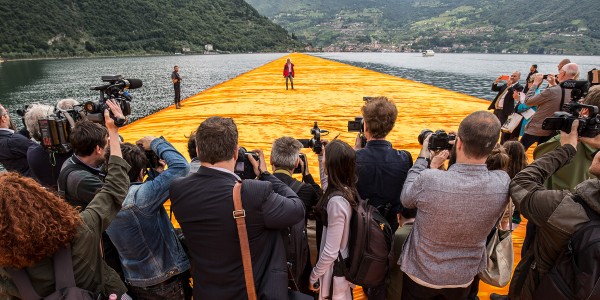
A lively Christo film (if not a beautiful one)
Jeanne-Claude died in late 2009, putting an end to the earthly part of one of contemporary art's greatest and most visible working partnerships and longest-lasting romances. Born on the same day, Bulgarian Christo and French Jeanne-Claude were inseparable for half a century. This legendary artistic team created great temporary environmental works that have been a source of pleasure and astonishment to millions all over the world. Some of their most famous works were the wrapping of the Reichstag in Berlin and the Pont-Neuf in Paris; the 24-mile hill-scanning Running Fence in California's Sonoma and Marin counties (when this reviewer got involved), and - a special, long-delayed passion project, because close to home, The Gates in Central Park, New York - their home town for forty years. Floating Piers is Christo's first major project completed since his wife's passing.
It still belongs to her too. In 1970 the couple together conceived a "floating pier" project. It was to allow the visiting public to walk out over the water over a special, temporary, lightweight, linked "pier." They tried to carry out this scheme in Rio de la Plata between Argentina and Uruguay, but failed to get approval; they tried again inTokyo Bay, and that plan also failed. This is not unusual for them. A lot of their projects have had to be jettisoned, due nearly always not to technical but to bureaucratic obstacles. Then in June 2016, Floating Piers came into being in Italy, on Lake Iseo, in Lombardy, near the cities of Brescia and Bergamo. This is a film about that project. see my article, "The Art of Christo & Jeanne-Claude and the Maysles Films" (24 Apr 2015).
Walking on Water,105 mins., debuted at Locarno and was included in other festivals including Docudays UA International Human Rights Documentary Film Festivalm abd the San Francisco Film Festival, where it was screened for this review. For The Floating PIers, see the Christo & Jeanne-Claude website.
SFFILM showtimes:
Sat, Apr 13 at 1:30 pm - SFMOMA
Fri, Apr 19 at 3:00 pm - Berkeley Art Museum/Pacific Film Archive
Last edited by Chris Knipp; 04-20-2019 at 11:09 PM.
-
WE BELIEVE IN DINOSAURS (Clayton Brown, Monica Long Ross 2018)
CLAYTON BROWN, MONICA LONG ROSS: WE BELIEVE IN DINOSAURS (2018)

David MacMillan at the Ark in We Believe in Dinosaurs
A hotbed of Creationism in the deep South shows the strength of Christian fundamentalism
This past summer in Williamstown, Kentucky, The Ark Encounter, a “life-size” reproduction of Noah’s Ark, opened to the public. . .Shot over the course of 3 years, “We Believe in Dinosaurs” follows the Ark Encounter from its groundbreaking to its opening day; from the designing and building of the Ark, to growing protests from scientists, Freethinkers, and even a Kentucky pastor. -Indiewire. Review in Hollywood Re;porter by Stephen Farber.
38% of Americans believe that God created humans in their present form less than 10,000 years ago. This is a clear and present danger, not just in Kentucky. In Washington, the current Vice President is a fundamentalist Christian. These are people who believe the Bible is packed with scientific facts, that mainstream science, particularly evolution, is erroneous. Brown and Ross focus on Ken Ham, an Australian Christian fundamentalist and young Earth creationist and apologist who is behind the Creation Museum and the giant Ark "model" he raised money to build. You have to be pretty naive and ignorant to believe a great flood created by God wiped out most of the world's population of humans and animals because they were "wicked," but there is a whole population of people who believe this.
It should be noted that "we believe in dinosaurs" doesn't refer to rationalists or pro-science people, because the Creation Museum is full of dinosaurs. The creationists believe there were dinosaurs on the Ark with the mammals. They'd have to be, if everything happened within six thousand years. And the creationists under Ken Ham make good use of the great popularity of dinosaurs among kids. Ham's complex is a place of entertainment - and instruction - primarily aimed at the young and innocent.
In this film, we see the forces of creationism marshaled under the organization of Ken Ham working to indoctrinate people, especially children. We also see David MacMillan, a young former creationist who prided himself on being in the inner circle of Ken Ham's organization, who wises up and leaves Kentucky, and now works as a paralegal in Washington, DC. We also see Daniel Phelps, a paleontologist who remains in Kentucky campaigning against Ham's programs. Naturally, as one well aware of the age of the earth and the galaxy, he finds the "young earth" theory of fundamentalists abhorrent and obviously absurd. But the effort to withdraw tax benefits for the Ark and the Museum which he was active in, was first successful, but later reversed, and he feels frustrated.
It seems that the little town near these things has failed to benefit economically by the tourism as had been hoped. But the Museum and the Ark are going great guns, and Ken Ham has plans for turning the remaining land they own into what sounds like a veritable Creationism Disneyland, a Creationland, if you will. This is an industry, and a growing movement.
People with rational, pro-science outlooks discount this whole element in the population. It's just something you don't want to believe exists. And this is clearly a mistake.
We Believe in Dinosaurs, 105 mins., debuted at San Francisco, where it was screened for this review.
SFFILM showtimes:
Sat, Apr 13 at 2:00 pm - Dolby Cinema (EVENT HAS PASSED)
Mon, Apr 15 at 3:00 pm - Roxie Theater (EVENT HAS PASSED)
Sun, Apr 21 at 2:00 pm - Grand Lake Theatre
Last edited by Chris Knipp; 04-21-2019 at 12:10 AM.
-
WINTER'S NIGHT/ 겨울밤에 (Jang Woo-jin 2018)
JANG WOO-JIN: WINTER'S NIGHT/ 겨울밤에 (2018)
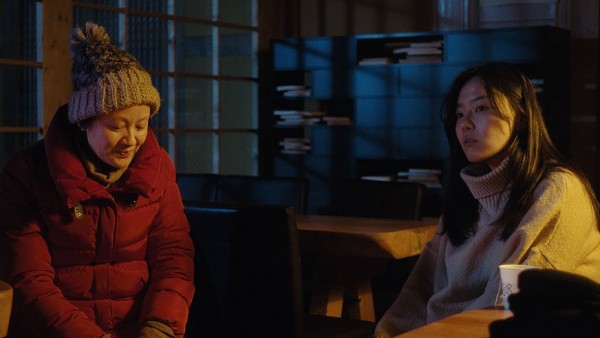
SEO YOUNG-HWA AND LEE SANG-HEE IN WINTER'S NIGHT
Young and old overnight in Chuncheon
Jang Woo-jin's third feature works with similar material to his second, Autumn, Autumn (ND/NF 2017). The latter's original Korean title was Chuncheon, Chuncheon: it had the same offbeat tourist location, with the Cheongpyeong Temple there, and couples who miss the last ferry and get stuck overnight. This time there is more focus and delicacy of mood. As Jessica Kiang puts it in her appreciative review for Variety written at the Tallinn Black Nights Film Festival in Estonia last year, this picture focuses on the "late-middle" of a relationship - and does so with delicacy, perception and humor surprising in a filmmaker who's only himself thirty-three. There is also an element of the surreal and the magical, making use of characters who rhyme and as Kiang puts it "capitalizing on the air of cut-off unreality that a fresh fall of clean snow can give — the upside-down-ness of the ground being brighter than the sky and the dampening of background sound until even banal exchanges take on a dramatic, stage-whisper quality." Besides, blue and red lights on the winter spaces highlight the unreality.
Taxi rides bookend the film. The riders are the fifty-year-old couple Eun-ju (a very fine Seo Young-hwa) and her husband Heung-ju (Yang Heung-ju), who at the outset are headed home to Seoul after their first return to Chuncheon in thirty years. It wss there, and then, with a young woman visiting her young man stationed there in the military, that their romance bloomed and the couple decided to marry. But after getting rudely sideswiped by a small truck, Eun-ju says she has left her phone behind, and doggedly insists on their turning back, seeming so bereft it suggests a much bigger sense of loss. (Later she will tell a priest the phone is "All I have" though all she can say it contains is "pictures.")
They go back, eventually miss the ferry, and settle in with a garrulous inn-keeper. Heung-ju has a "soju-soaked" evening during which they wander off in different directions. He sings a loud sentimental song at a deserted karaoke bar and meets an old girlfriend who laughs at him, while he cries. Eun-ju gets trapped on the edge of thin ice and is rescued by a young couple. They are the mirror image of Eun-ju and Heung-ju, a couple perhaps in love but not yet engaged, the beautiful long-haired young woman (Lee Sang-hee) come to see the soldier (Lee Sang-hee) who is stationed there, just the same. Maybe they are Eun-ju and Heung-ju; maybe the fifty-ish couple are visiting themselves at that time when all was hopeful. (Kiang refers to Kiarostami's Cerfified Copy. But first of all somewhere Hong Sang-soo must be seen as an influence.)
The film is beautifully conceived in a series of scenes, separated from each other by shots of a succession of matching but different long horizontal paintings. This is slow cinema that accustoms us to its rhythms and teaches us to savor its stops and starts. The pauses - particularly Eun-ju's - are more beautiful than anything that happens. Seo Young-hwa is a continual surprise and delight to watch; she is a reserved but nonetheless very real figure, and in her one feels life is being caught on the wing, and yet something otherworldly too, beyond life, also being caught. Little details flow quietly by and are noticed, such as the forgotten pair of gloves on the ground; the small mound of prayer stones fallen over.
There are long static wide shots and delicate, tentative conversations, some with laughter and delight, some with tears and the fear of falling through thin ice. There are some blunt exchanges between Eun-ju and Heung-ju when they sit down to drink. "I'm bored out of my mind," she tells him, and "Honestly, you’re not fun." She admits she stayed with him because he seemed to care so much about her, and then he seemed to stop caring. "This is the way the world ends. This is the wary the world ends. . . " But she is delighted with the young woman in love and hopeful for her. Perhaps she is having a grand crisis like Stefania Sandrelli in Muccino's L'ultimo bacio but in a more hushed, subtle, Asian way, with more irony and less drama - but plenty of drama for us.
Winter's Night, 98 mins., debuted at Jeonju and showed at other festivals including Mar del Plata, Belfort, Rotterdam - and San Francisco, where it was screened for this review.
SFFILM showtimes were:
Fri, Apr 12 at 6:00 pm - Creativity Theater
Sun, Apr 14 at 5:30 pm - Berkeley Art Museum/Pacific Film Archive
Mon, Apr 15 at 8:30 pm - The Theater at Children's Creativity Museum
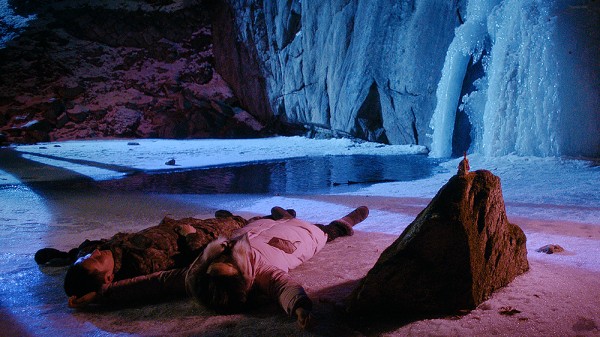
Last edited by Chris Knipp; 04-21-2019 at 11:40 PM.
 Posting Permissions
Posting Permissions
- You may not post new threads
- You may not post replies
- You may not post attachments
- You may not edit your posts
-
Forum Rules





 Reply With Quote
Reply With Quote









Bookmarks